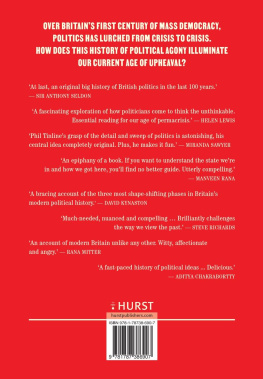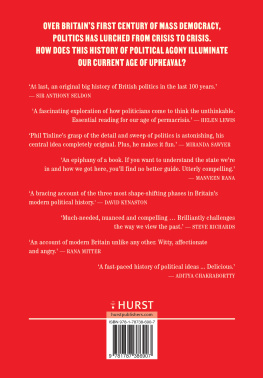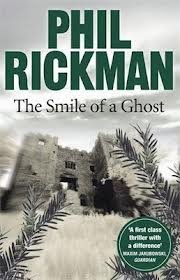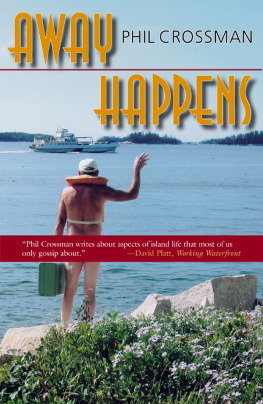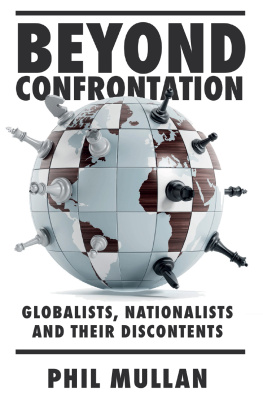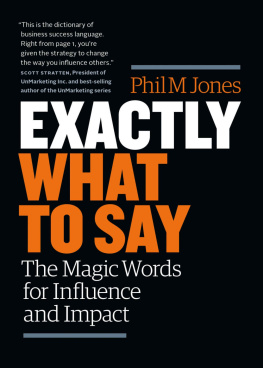Phil Tinline - The Death of Consensus
Here you can read online Phil Tinline - The Death of Consensus full text of the book (entire story) in english for free. Download pdf and epub, get meaning, cover and reviews about this ebook. year: 2022, publisher: C. Hurst & Co. (Publishers) Ltd, genre: Politics. Description of the work, (preface) as well as reviews are available. Best literature library LitArk.com created for fans of good reading and offers a wide selection of genres:
Romance novel
Science fiction
Adventure
Detective
Science
History
Home and family
Prose
Art
Politics
Computer
Non-fiction
Religion
Business
Children
Humor
Choose a favorite category and find really read worthwhile books. Enjoy immersion in the world of imagination, feel the emotions of the characters or learn something new for yourself, make an fascinating discovery.
- Book:The Death of Consensus
- Author:
- Publisher:C. Hurst & Co. (Publishers) Ltd
- Genre:
- Year:2022
- Rating:4 / 5
- Favourites:Add to favourites
- Your mark:
- 80
- 1
- 2
- 3
- 4
- 5
The Death of Consensus: summary, description and annotation
We offer to read an annotation, description, summary or preface (depends on what the author of the book "The Death of Consensus" wrote himself). If you haven't found the necessary information about the book — write in the comments, we will try to find it.
The Death of Consensus — read online for free the complete book (whole text) full work
Below is the text of the book, divided by pages. System saving the place of the last page read, allows you to conveniently read the book "The Death of Consensus" online for free, without having to search again every time where you left off. Put a bookmark, and you can go to the page where you finished reading at any time.
Font size:
Interval:
Bookmark:

At last, an original big history of British politics in the last 100 years.
Sir Anthony Seldon, biographer of prime ministers and co-author of The Impossible Office?
A fascinating exploration of how politicians come to think the unthinkable,The Death of Consensus is essential reading for our age of permacrisis.
Helen Lewis, author of Difficult Women: A History of Feminism in 11 Fights
Phil Tinline is exceptionally clever, and this fascinating book makes us rethink the British, our government and how we want to be governed. His grasp of the detail and sweep of politics is astonishing, his central idea completely original. He makes us look at familiar faces and events with new clarity, as though weve remembered to clean our glasses. Plus, he makes it fun.
Miranda Sawyer, journalist and broadcaster
This is an epiphany of a book and everyone should read it, urgently. If you want to understand the state were in and how we got here, youll find no better guide than Phil Tinline. Intelligent, incredibly well-informed and utterly compelling.
Manveen Rana, host of Stories of our Times, Times Radio
A bracing and highly accessible account of the three most shape-shifting phases in Britains modern political history.
David Kynaston, author of Austerity Britain; Family Britain; and Modernity Britain
A much-needed, nuanced and compelling account. Tinline brilliantly challenges the way we view the past and inspires us to take a fresh look.
Steve Richards, author of The Prime Ministers We Never Had
An account of modern Britain unlike any other. Tinlines portrait of people and ideas is witty, affectionate and angry, reintroducing us to a place we thought we knew, but which looks fresh through his eyes.
Rana Mitter, historian and Vice-President of the British Academy
Admirers of Phil Tinlines radio programmes are in for a treat. Here in proper portion size is his trademark fast-paced history of political ideas, studded with stories about Barbara Castle and Keith Joseph. Delicious.
Aditya Chakrabortty, Senior Economics Commentator, The Guardian
This perceptive and sharply insightful book will change how you think about consensus itselflet alone how it is established and retained. Its a riveting new lens through which to reassess some key moments from the last century.
James Ball, Global Editor, The Bureau of Investigative Journalism
THE DEATH OF CONSENSUS
PHIL TINLINE
The Death of Consensus
100 Years of British Political Nightmares

HURST & COMPANY, LONDON
First published in the United Kingdom in 2022 by
C. Hurst & Co. (Publishers) Ltd.,
New Wing, Somerset House, Strand, London, WC2R 1LA
Phil Tinline, 2022
All rights reserved.
Printed in the United Kingdom
Distributed in the United States, Canada and Latin America by Oxford University Press, 198 Madison Avenue, New York, NY 10016, United States of America.
The right of Phil Tinline to be identified as the author of this publication is asserted by him in accordance with the Copyright, Designs and Patents Act, 1988.
A Cataloguing-in-Publication data record for this book is available from the British Library.
This book is printed using paper from registered sustainable and managed sources.
ISBN: 9781787386907
www.hurstpublishers.com
For my parents
CONTENTS
PART ONE
193145
PART TWO
196885
PART THREE
200822
INTRODUCTION
CONSENSUS AND NIGHTMARE
In 2008, the Crash sent cracks running through the foundations of the free-market thinking that had long dominated British politics. Ever since, we have been living through shocks and crises. From the 2011 riots, to the Brexit wars, to the grind of the pandemic, Britain has seemed trapped between watching the old order collapse, and waiting for another to be born. The public have often been divided; democratic institutions have come under terrible strain. A decade of hung parliaments and short-lived governments ended with the general election of December 2019, which delivered the first large parliamentary majority since 2005but then came Covid-19, and a whole new array of challenges to the old certainties. After years of trying, no one has yet managed to lead us to a settled new consensus.
But was there ever really a consensus in British politics? The term is most often used with post-war tacked before it, to describe the years from the Labour election victory in 1945, to the turmoil of the 1970s and the rise of Thatcherism. The Conservative governments of the 1950s, however grudgingly, accepted much of the model built by Labour. But the period that began in 1945 did not utterly transform British society, with everyone in the country suddenly invested in an entirely new set of ideas. Nor did 1979 bring a total reversal of the ways Britain had been governed since the end of the war. The idea of consensus became prominent in scholarship in the 1970s, but since then, it has often been challenged, in useful and necessary ways. Consensus is not, for instance, a particularly helpful way to understand the development of the welfare state, which had its origins long before 1945, and was not scrapped after 1979. Too often, consensus is used as a glib generalisation, smoothing important political fights from the collective memory. Yet the idea of consensus is also remarkably tenacious, not least because it appears to shape the thinking of many politicians.
No one could seriously think that politics is ever somehow harmonious. The most the political establishment can ever manage is a relatively high degree of compromisea relative absence of agony. A period of consensus might best be defined as one where there is agreement, at least, on what to reject. Modern Britains past periods of consensus have centred on a shared understanding, whatever the differences between the political parties, that something was unthinkable: budget deficits, mass unemployment, inflation, strikes. These were the limits that shaped the politically possible. Those who accepted them did so for very different motives: for some, it was belief, sympathy, or the scars of personal experience; for others, just building a political career. And these periods of consensus were more of a strained compromise for one party than another. This meant they could only hold for so long.
So I want to use this idea, of consensus based on something unthinkable, to make sense of how the long-fixed boundaries of what is politically possible can start to move. Specifically, I want to explore how all of this is shaped by the fears, memories and imaginations of politiciansalong with journalists, novelists, playwrights, screenwriters, policy advisers, and many others. To do this, we need a second idea: the political nightmare.
The word nightmare is useful here partly because, like consensus, politicians use it so readily; but also because it is ambiguous. It encompasses fears based on past disasters, and fears based only on possible future ones; threats that are actually present, and possibilities that exist only in the imagination. They are sometimes passionate expressions of fear, or strategic warnings, or cynical scare stories, but all of theseeverything I classify as a nightmareis a prospect that is both vividly present in politicians minds, and somehow intolerable. It could be hyperinflation. National bankruptcy. Mass unemployment. Fascist dictatorship, total war, or Nazi invasion. Socialist dictatorship, or trade union tyranny. Or mass racial strife, violent anarchy, a police state, a catastrophic no-deal Brexit, the thwarting of a referendum, or the closing down of parliamentary democracy. This book is the story of how, no matter whether they are based on memories, precedents or imagined fears, these nightmares have hemmed politicians in, and shaped what they thought they could and could not do.
Next pageFont size:
Interval:
Bookmark:
Similar books «The Death of Consensus»
Look at similar books to The Death of Consensus. We have selected literature similar in name and meaning in the hope of providing readers with more options to find new, interesting, not yet read works.
Discussion, reviews of the book The Death of Consensus and just readers' own opinions. Leave your comments, write what you think about the work, its meaning or the main characters. Specify what exactly you liked and what you didn't like, and why you think so.

